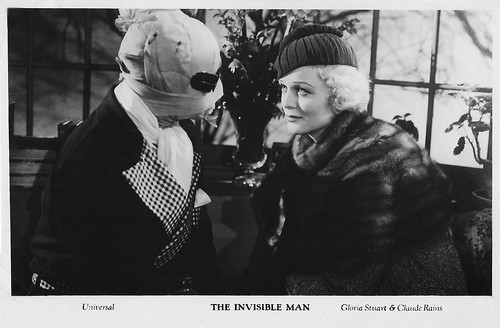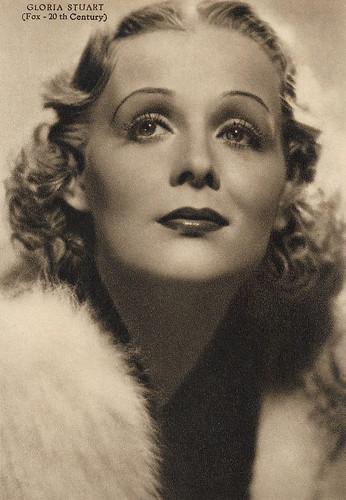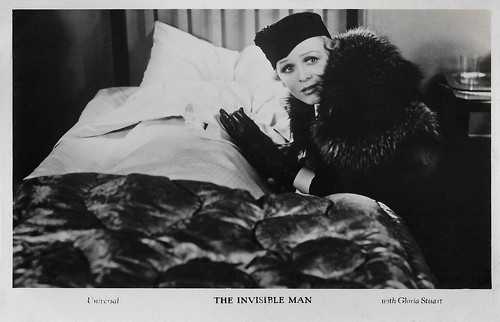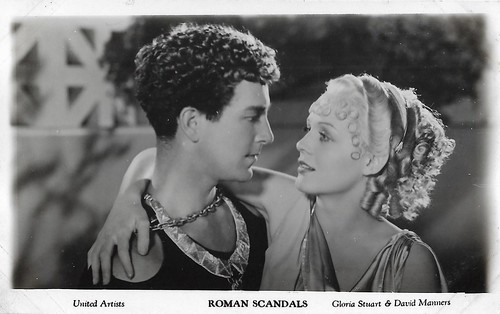
British postcard in the Filmshots series by Film Weekly. Photo: Universal. Gloria Stuart and Claude Rains in The Invisible Man (James Whale, 1933).

British postcard, no. 88. Photo: Universal Pictures.

British postcard by Milton, no. 88a. Photo: Universal Pictures.
Directed by James Whale
Gloria Stuart was born Gloria Stewart on her family's dining room table on 4th Street in Santa Monica, California in 1910. She was the first child of Alice (née Deidrick) and Frank Stewart. At the time of her birth, her father was an attorney representing The Six Companies. When Stuart was nine years old, her father died as the result of an infection from an injury sustained when an automobile grazed his leg. Hard-pressed to support two small children, her mother soon accepted the proposal of local businessman Fred J. Finch.
Her early roles as a performing artist were in plays she produced in her home as a young girl. She was the star of her senior class play, 'The Swan', at Santa Monica High School in 1927. Attending the University of California, at Berkeley, she continued to perform on the stage. Stuart married Blair Gordon Newell, a young sculptor, and moved to Carmel, where she performed in a production of Anton Chekhov's 'The Seagull' which was transferred to the Pasadena Playhouse in 1932.
It was at the Opening Night there that talent scouts for both Paramount and Universal saw her. She decided to sign a contract with Universal, which paid a bit more than Paramount. After a few film appearances, Stuart was selected as one of the WAMPAS Baby Stars that year. These were new film actresses "Most Likely to Succeed". She then played lead roles for director James Whale in the horror comedy The Old Dark House (1932) with Boris Karloff, the fantasy The Invisible Man (1933) starring Claude Rains and the drama The Kiss Before the Mirror (1933) with Nancy Carroll and Paul Lukas.
In The Old Dark House (1932), she played the glamour role of a sentimental wife who winds up stranded among strangers at a spooky mansion, among the ensemble cast (Boris Karloff, Melvyn Douglas, Charles Laughton, Lilian Bond, Ernest Thesiger, Eva Moore and Raymond Massey). The film was critically praised, and The New York Times called Stuart's performance "clever and charming," with the film later becoming a cult classic. The hard work at the studio estranged her from her first husband. Stuart later helped to create the Screen Actors Guild. Stuart was given a co-starring role by director John Ford in Air Mail (1932), playing opposite Pat O'Brien and Ralph Bellamy.
Gloria Stuart played the leading lady opposite Eddie Cantor in Roman Scandals (Frank Tuttle, 1933), on the set of which she met her second husband, screenwriter Arthur Sheekman. They married in 1934. She was dissatisfied with the roles in which she was cast at Universal and moved to 20th Century Fox. She had some success with The Gold Diggers of 1935 (Busby Berkeley, 1935) as Dick Powell's love interest, and The Prisoner of Shark Island (John Ford, 1936), but she was not to make the leap into the front row of Hollywood stars. In June 1936, she helped Paul Muni, Franchot Tone, Ernst Lubitsch, and Oscar Hammerstein II form the Hollywood Anti-Nazi League. That same year she and writer Dorothy Parker helped create the League to Support the Spanish Civil War Orphans. A few years after having her daughter Sylvia (1935), she left the cinema and sought roles on the stage in New York.

British cigarette card by Player's Cigarettes in the second Film Stars series. no. 43. Photo: Universal.

Italian postcard by Rizzoli & C., Milano, 1936. Photo: Fox - 20th Century.

British postcard in the Picturegoer Series, London, no. 772a. Photo: Radio.
A comeback in the cinema at 87
In the 1940s, Gloria Stuart opened an art furniture shop where she created decoupage lamps, tables and trays, many of which sold to stars like Judy Garland and others. Later, Stuart took up oil painting and was very prolific, showing and selling her work in New York, Los Angeles and elsewhere. Her landscapes of The Watts Towers are on permanent collection at The Los Angeles County Museum. She also took up and mastered the art of bonsai and some of her trees are on permanent collection in the Huntington Library Japanese Garden.
When her husband fell ill in the 1970s and died in 1978, she returned to acting doing a range of television series. In 1982, she returned to the screen appearing in a brief dance scene with Peter O'Toole in My Favorite Year (Richard Benjamin, 1982). After that, Stuart was in Jack Lemmon's drama Mass Appeal (Glenn Jordan, 1984) and Goldie Hawn's comedy Wildcats (Michael Ritchie, 1986). Stuart learned the craft of fine printing and established a printing press in her home studio called Imprenta Glorias, where she created a body of artist's books. Her book, 'Flight of Butterfly Kites' is in the permanent collection at the J. Paul Getty Museum.
At the age of 87, she made a comeback in the cinema. Gloria Stuart won a Screen Actors Guild Award and an Oscar nomination for her performance as the Old Rose, the 101-year-old survivor of shipwreck, in the epic romance Titanic (James Cameron, 1997), starring Leonardo Di Caprio and Kate Winslet. Titanic became the highest-grossing film of all time at the time.
A vintage publicity photo of her was also used for the image of 'Peg', the sister of butler Alfred Pennyworth, in Batman & Robin (Joel Schumacher, 1997). She played her last film roles in director Wim Wenders' films The Million Dollar Hotel (2000) and Land of Plenty (2004), starring Michelle Williams. In 2010, The Academy of Motion Picture Arts & Sciences honored Gloria Stuart with a Centennial Celebration. She was the first such honoree to be living for a centennial.
At 100 years of age, she had completed her greatest artist's book with her great-granddaughter working as her apprentice and also her final appearance on film in her grandson's documentary about her, entitled Secret Life of Old Rose: The Art of Gloria Stuart (Benjamin Stuart Thompson, 2012) when she died at home at the age of 100 in 2010. Stuart's great-granddaughter, Deborah B. Thompson, produced an e-book, 'Butterfly Summers: A Memoir of Gloria Stuart's Apprentice'.

British postcard in the Filmshots series by Film Weekly. Photo: Universal. Gloria Stuart (and Claude Rains) in The Invisible Man (James Whale, 1933).

British postcard in the Filmshots series by Film Weekly. Photo: Universal. Gloria Stuart and Henry Travers in The Invisible Man (James Whale, 1933).

British postcard in the Filmshots series by Film Weekly. Photo: United Artists. David Manners and Gloria Stuart in Roman Scandals (Frank Tuttle, 1933).

British postcard in the Film Partners Series, London, no. P 142. John Boles and Gloria Stuart in Beloved (Victor Schertzinger, 1934).
Sources: Wikipedia (Dutch, German and English) and IMDb.
No comments:
Post a Comment